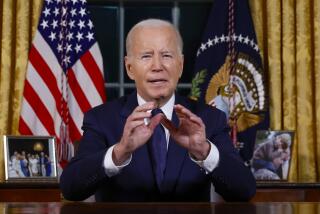Two Views From Abroad on Campaign ’92 Focus on Status Quo,Survival : Russia: America’s decision affects disarmament and other unresolved post-Soviet Issues.
- Share via
MOSCOW — During the Cold War era, U.S. presidential campaigns were watched by the Soviet political elite with pathological interest even though the policies of U.S. Presidents did not influence the domestic situation in the tightly controlled Soviet Union.
Disintegration of the Soviet superpower has changed all that. The new Russian Establishment is too preoccupied with mounting domestic problems to care about U.S. elections. But if people in the Kremlin had time to take a stand, they would probably side with George Bush, a symbol of prudence and continuity in U.S. foreign policy.
However, they may be wrong on both counts because the outcome of 1992 elections may have real long-term consequences for Russia and because prudence and continuity should not be considered pivotal virtues of the next President from Russia’s perspective.
From Moscow, it appears that most people in Washington tend to believe that the monolithic Soviet Union simply broke up into 15 coherent nations, and that Russia just has taken its place as the largest Eurasian power. In reality, new nations are still in the process of being born within former Soviet boundaries, and their emerging constellation is marked with growing complexity. New strategies are clearly needed to influence developments there.
It is particularly important to reassess the nuclear dimension of the post-Cold War situation. Deterrence strategists assume that opponents are rational and able to exercise control over their nuclear arsenals. However, the Ukraine is still bargaining with Russia over control over nuclear weapons deployed on Ukrainian soil, and Kazakhstan also hinted that it would like to retain nuclear status of some kind.
The former Soviet Army, like other post-Soviet institutions, is plagued with declining morale and growing corruption. There is no guarantee that each of the 25,000 nuclear warheads will be kept under secure control in such circumstances. And new masters of some of these weapons may not adhere to conventional rationality.
The Bush Administration is trying to avert such perils with modest assistance programs, and with threats to withhold aid as punishment. However, rightly or wrongly, the U.S. efforts are perceived by many Russians as inadequate.
Even more important, there are too many conditions--they cover everything from the financial discipline of the government to limitations of arms sales abroad--to be met by Russia.
U.S. assistance is really much needed to help Russia to get out of the crisis and to stabilize the situation here, but such programs must be more innovative to have real impact.
There is also an unlimited demand for all kinds of Western know-how in Russia. Thousands of experts are needed to help people to start businesses, explain marketing and to teach efficient management in virtually every aspect of market economies. A truly massive program of this kind, started by the U.S. President, would show that he cares less about realpolitik and more about the values of liberal internationalism.
Human rights may be a particularly painful and important issue for Russians. This issue was used by a number of U.S. Administrations to undermine the “evil empire,” and it really contributed to the empire’s demise.
There are still serious human-rights problems in the former Soviet Union, including Russia. But Russians have also become an ethnic minority in the Baltic states, where they have been deprived of the right to vote, or in Latvia and Estonia to receive their share of state property.
The Baltic states are perceived in Russia as a part of the West. Many Russians tend to believe that the West has been hypocritical in its human-rights efforts, and have started to question liberal values per se. Such disillusionment is combined with the economic crisis, and may eventually help to produce an authoritarian regime in still-powerful Russia.
In order to help Russia and its neighbors to become full-fledged nations and assure stability and security in this region, the United States should get directly involved in systemic reforms here. Is the course going to be changed by Washington? There is, after all, a good reason for us in Moscow to care about the outcome of elections on other side of the Atlantic.
More to Read
Sign up for Essential California
The most important California stories and recommendations in your inbox every morning.
You may occasionally receive promotional content from the Los Angeles Times.










